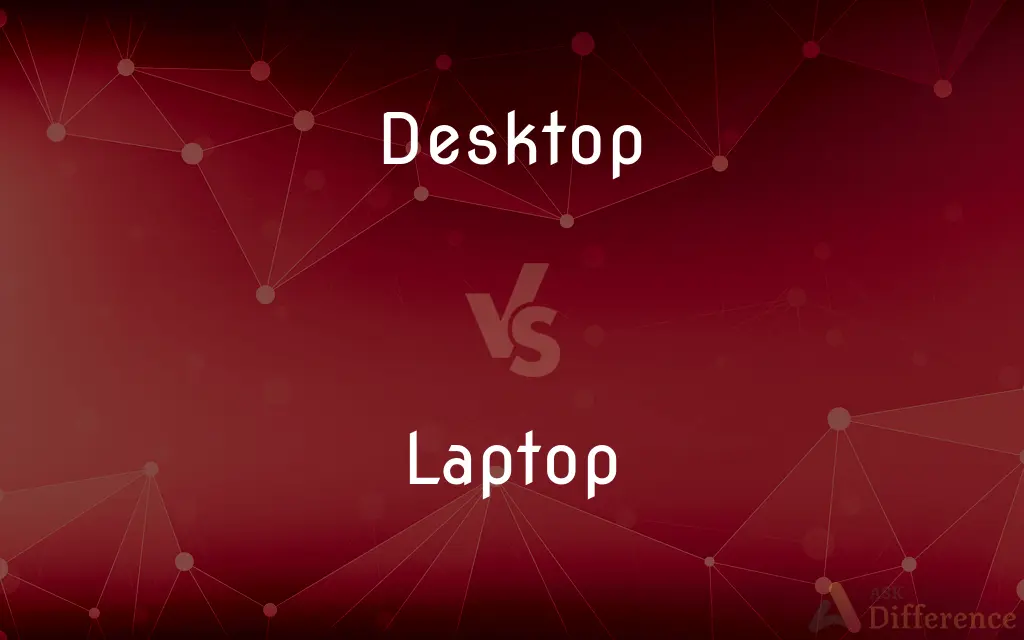Desktop vs. Laptop — What's the Difference?
By Maham Liaqat & Urooj Arif — Updated on March 15, 2024
Desktops offer expansive customization and power, while laptops provide mobility and integrated functionality.

Difference Between Desktop and Laptop
Table of Contents
ADVERTISEMENT
Key Differences
Desktop computers are known for their power and customization options, making them ideal for intensive tasks and gaming. On the other hand, laptops are valued for their portability and all-in-one design, catering to those needing computing power on the go.
While desktops often boast superior hardware due to fewer space constraints, allowing for easier upgrades and repairs, laptops integrate their components into a compact space, sacrificing some performance for mobility.
Desktops typically require a separate monitor, keyboard, and mouse, which can lead to a more ergonomic and customizable setup. Laptops, however, offer an integrated screen, keyboard, and touchpad, prioritizing convenience and space-saving.
In terms of cost, desktops can offer more power for the same price due to the lower cost of individual components. Laptops, while sometimes more expensive for equivalent performance, offer the advantage of mobility and space efficiency.
Energy consumption is another differentiator, with desktops generally consuming more power due to their more powerful components, while laptops are designed to maximize battery life, resulting in lower energy usage.
ADVERTISEMENT
Comparison Chart
Customization
High
Limited
Portability
Low
High
Components
Separated
Integrated
Ergonomics
Customizable
Fixed
Energy Consumption
Higher
Lower
Compare with Definitions
Desktop
Highly customizable
He upgraded his desktop with the latest graphics card for a superior gaming experience.
Laptop
Portable computing
She took her laptop to the café to work remotely with ease.
Desktop
Separate peripherals
He preferred a desktop for its ergonomic keyboard and monitor setup.
Laptop
Integrated design
His laptop's built-in webcam facilitated convenient video conferences.
Desktop
Powerful performance
Her desktop's high-end processor ensured seamless video editing.
Laptop
Battery-powered
She relied on her laptop's long battery life during extended meetings.
Desktop
Energy-intensive
Running high-performance tasks on his desktop significantly increased his electricity bill.
Laptop
Compact form factor
His compact laptop fit easily into his backpack for travel.
Desktop
Stationary setup
Her desktop workstation was equipped with dual monitors for multitasking.
Laptop
Less upgradeable
She found it difficult to upgrade her laptop's RAM due to its integrated components.
Desktop
The top of a desk.
Laptop
A laptop, laptop computer, or notebook computer is a small, portable personal computer (PC) with a screen and alphanumeric keyboard. These typically have a "clamshell" form factor, typically having the screen mounted on the inside of the upper lid and the keyboard on the inside of the lower lid, although 2-in-1 PCs with a detachable keyboard are often marketed as laptops or as having a "laptop mode." Laptops are folded shut for transportation, and thus are suitable for mobile use.
Desktop
The area of a display screen where images, windows, icons and other graphical items appear.
Laptop
A portable computer with a display screen hinged to a keyboard, small enough to use on one's lap.
Desktop
The portion of the hard drive where the file contents that are displayed on the desktop screen are stored
Saved the file to the desktop.
Laptop
(computing) A laptop computer.
Desktop
A computer that is designed to be used at a desk or table and is not easily moved, in contrast to a laptop or other portable device. Also called desktop computer.
Laptop
A portable computer small enough to use in your lap
Desktop
Designed for use on a desk or table
A desktop telephone.
Desktop
The top surface of a desk.
Desktop
(computing) A desktop computer.
Laptops are often more expensive than desktops.
Desktop
(computing) A personal computer, as opposed to computers for business or server purposes.
Desktop
The main graphical user interface of an operating system, usually displaying icons, windows and background wallpaper.
I installed a new application and it added its icon to my desktop.
Desktop
The wallpaper of this interface.
Desktop
Designed for use on a desk or similar piece of furniture.
Desktop
(computing) Of an application or website, designed to be run or viewed on a personal computer.
Desktop browser
Desktop
The top of a desk
Desktop
(computer science) the area of the screen in graphical user interfaces against which icons and windows appear
Common Curiosities
Do desktops consume more energy than laptops?
Generally, desktops consume more energy due to their more powerful components and lack of battery constraints.
What is the main advantage of a desktop over a laptop?
The main advantage is its superior customization and upgrade potential, allowing for more powerful performance.
Are laptops as powerful as desktops?
While laptops are powerful, they often lag slightly behind desktops in terms of raw performance due to space and thermal constraints.
Do laptops offer the same level of gaming experience as desktops?
High-end gaming laptops offer impressive gaming experiences, but desktops usually provide better performance and cooling for the same price.
Why might someone prefer a laptop to a desktop?
Laptops are preferred for their portability and convenience, suitable for those who need to work from various locations.
Can desktop components be easily upgraded?
Yes, desktops allow for easy upgrades and replacements of components like RAM, GPUs, and storage.
Can laptops handle gaming and intensive software as well as desktops?
High-end laptops can handle gaming and intensive software, but desktops can offer better performance for the same price.
Why are laptops more expensive than desktops with similar specifications?
Laptops often cost more due to the miniaturization of components and the integration of peripherals.
Is ergonomic setup more achievable with desktops or laptops?
Desktops offer more ergonomic customization with separate, adjustable peripherals like monitors and keyboards.
Are laptops suitable for long-term, stationary work setups?
While feasible, laptops might require additional peripherals, like external keyboards and monitors, for ergonomic long-term setups.
How does the portability of laptops affect their performance?
The compact design and battery dependence of laptops can limit their performance compared to desktops, especially in high-demand applications.
Are all desktop components interchangeable?
Most components are interchangeable, but compatibility with the motherboard and power supply must be considered.
Is it possible to upgrade a laptop's graphics card?
Unlike desktops, most laptops have integrated graphics cards, making them difficult or impossible to upgrade.
Can desktop setups be more energy-efficient?
Yes, by choosing energy-efficient components and peripherals, desktop setups can be made more energy-efficient.
How does the repairability of laptops compare to desktops?
Desktops are generally easier and cheaper to repair due to their modular design, while laptops can be more complex and costly to fix.
Share Your Discovery

Previous Comparison
Cud vs. Cod
Next Comparison
Camping vs. CampsiteAuthor Spotlight
Written by
Maham LiaqatCo-written by
Urooj ArifUrooj is a skilled content writer at Ask Difference, known for her exceptional ability to simplify complex topics into engaging and informative content. With a passion for research and a flair for clear, concise writing, she consistently delivers articles that resonate with our diverse audience.














































